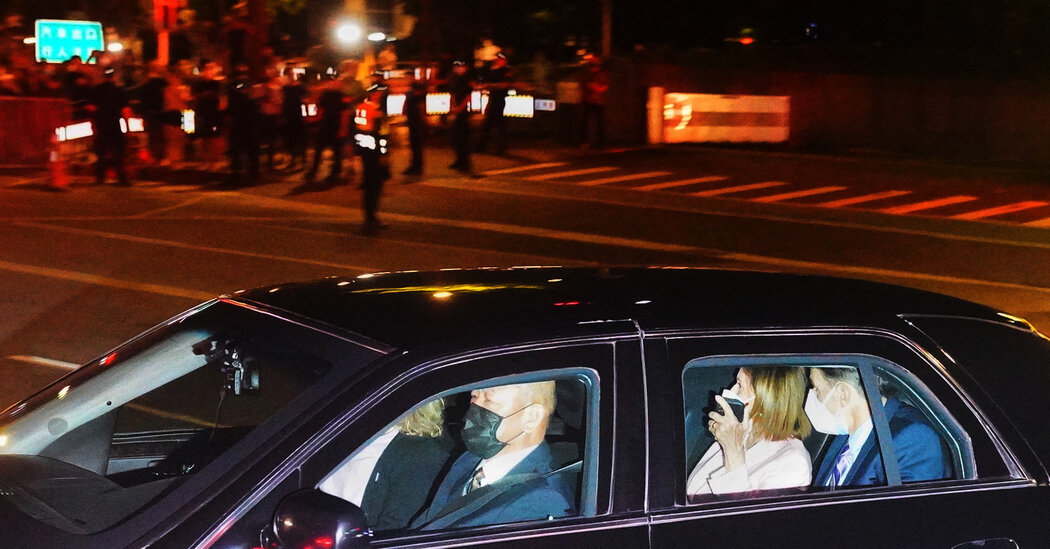

TAIPEI, Taiwan — The news media and crowds gathered at the Taipei airport on Tuesday to watch the arrival of Speaker Nancy Pelosi, the highest-level United States official to visit Taiwan in 25 years.
Huang Chao-yuan, a 53-year-old business owner, staked out the area near Songshan airport to watch as Ms. Pelosi’s plane landed, calling the speaker’s visit a “historic moment.”
“I am quite excited about her visit today, because it’s an example that shows the United States does not need to discuss with the C.C.P., she can come here if she wants, and whoever Taiwan invites can come here,” said Ms. Huang, using the acronym for the Chinese Communist Party. “This incident demonstrates Taiwan’s independence.”
Henry Chang, 32, a videographer who was at the airport to witness Ms. Pelosi’s landing, marveled at the novelty of seeing the arrival of such a high-profile U.S. lawmaker.
“It felt like catching a rare Pokémon,” he said.
He said he was unconcerned that the visit might lead to military conflict. “I feel like a war simply couldn’t happen — everyone will go on with their lives,” he said.
A video provided by a Tibetan activist, Tashi Tsering, showed people on Tuesday night gathering outside the Grand Hyatt Taipei, where Ms. Pelosi was expected to spend the night. A number of them held up banners reading, “The public of Taiwan welcomes US House Speaker Nancy Pelosi,” “Taiwan is helping” and “Taiwan ≠ China.”
Outside the hotel, several dozen people supporting unification with China protested against Ms. Pelosi’s visit: Some clamored for her to “get out of Taiwan,” and some held banners denouncing her.
“I feel bittersweet on witnessing Pelosi’s landing,” said one man in the crowd, Sam Lin, the owner of a recycling company. “It’s sad to see the rising tensions across the strait, yet I’m also excited to see our reunification with China is becoming more achievable.”
Mr. Lin, 50, added, “I don’t want to see a war, but the current cross-strait relations have reached another stage.”
In contrast to the protest, in the capital’s central business district, Taipei 101 — once the world’s tallest building and a major landmark in the city’s skyline — was lit with messages welcoming Ms. Pelosi.
In Taiwan, many are inured to threats from China, which claims the island as its own territory. A standoff between Washington and Beijing over the speaker’s trip received subdued attention before Tuesday. Taiwan’s president, Tsai Ing-wen, kept mum in the days before Ms. Pelosi’s arrival, though political advisers close to her have said they welcome visits from U.S. officials.
In a signal of how many in Taiwan have grown weary of China’s threats, Alexander Huang, a top official with the China-friendly Kuomintang, said that he welcomed Ms. Pelosi’s visit and that she had a “rich” schedule ahead of her on the island.
During her visit, Ms. Pelosi is scheduled to visit Taiwan’s Legislature and meet with President Tsai Ing-wen, according to one Taiwanese lawmaker and one local official. She is also scheduled to attend a banquet at Taipei Guest House and visit the National Human Rights Museum.
Mr. Huang said the understated approach to the visit reflected planning designed to avoid exacerbating an already tense situation with China.
“They did not make a statement to the outside world, trying not to antagonize the other side, and had done their best to make the situation in the Taiwan Strait not too tense,” he said.
He said he was most worried about the military response from mainland China — in particular, what China might do after Ms. Pelosi leaves. He said it was possible that China would take moves to further isolate Taiwan internationally. In recent years, China has lured away several nations that recognize Taiwan as a country and cut it off from major international agencies like the World Health Organization.
On Tuesday, Taiwan’s military said it would strengthen combat readiness in anticipation of a potential response from China.
